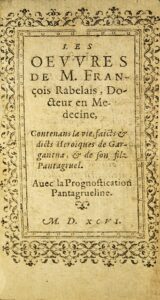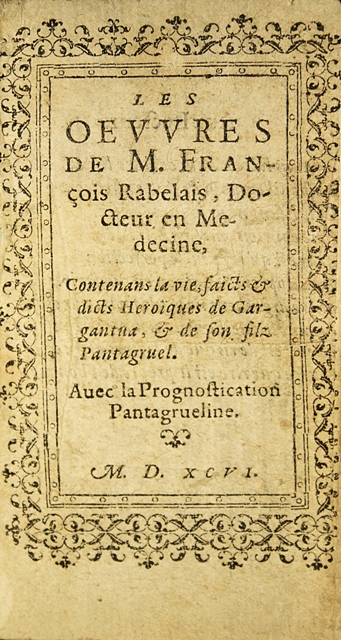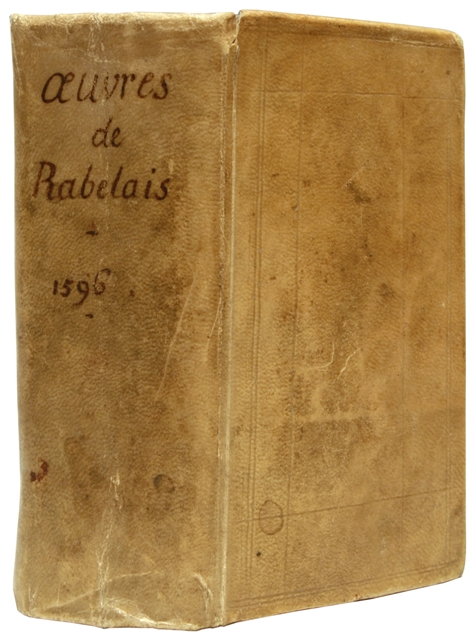N.p., 1596.
16mo of 800 pp., (15) ll. and (1) bl.l.
– Le Cinquiesme et dernier livre des faits & dits heroïques du bon Pantagruel. Auquel est cŏtenu ce qui s’ensuit. Les navigations & isle Sonnante. L’isle des Apedestes, de nouveau adiousté. La cresme Philosophale. Une epistre limosine. Avec la visitation de l’oracle de la Diue Bacbuc, & le mot de la Bouteille : pour lequel a esté entrepris tout ce long voyage. Le tout composé par M. François Rabelais Docteur en Medecine.
Lyon, Pierre Estiart, 1596.
16mo of 193 pp., (2) ll., sligthly short at the head with some ll. affected. Title leaves slightly trimmed on the outer margins. Exactly identical to the copy described by Tchemerzine.
2 parts together in one 16mo volume [119 x 67 mm] bound in vellum, blind-stamped frame on the covers, flat spine with the title and date calligraphed. 19th century binding made after old reused vellum.
The famous and extremely rare Protestant edition of Rabelais’ Works, enclosing the entire work of the author.
Brunet, IV, col. 1058; Tchemerzine, V, 314 – Plan, Les éditions de Rabelais, 115.
“We think it must have been printed in the Protestant press of Montbéliard, or perhaps in the ones of La Rochelle.”
“La Brieue declaration follows the fourth book, which gives to this edition a particular interest. It is, to our knowledge, the only one, published under the title of Works, which, since the 1556 Edition, reproduces this important play. It is elegantly printed, in very fine characters.” (Plan).
The Rabelais miracle.
“Let’s talk about it, in the way of the “Greek miracle”, meeting between logic and art, the ‘miracles’ are more easily explained than the ordinary and the everyday life. The Rabelais miracle comes from the reunion between laughter and knowledge. In the sense that, it realizes, by surpassing it, a big medieval dream: the Joyful science, the junction between North and the Mediterranean. The joyful Science results from that at that time the popular life in its new and untouched freshness presents to the genius man the figures he will (and him alone) be able to seize to say what he can and must (and him alone) say”.
“How to see his work? a magnificent palace with corners full of garbage, as said Anatole France somewhere? a town inn, where we drink some simple white wine in good company? a landscape of vineyards, fields and prairies? or a mysterious mountain with pagan temples in ruins, Middle-Ages castles, audacious modern buildings with chasms and tops lost in the clouds? Yes. And something else unique that we will once more define by the junction between joie de vivre and lucidity”. Henri Lefebvre.
Precious copy preserved in its reused vellum binding.
Copies listed by Plan: Bibl. Nat. Rés. Y². 2I90-9I – Pichon, 980 (Hoym’s copy) – Taschereau, 1660. – Potier, 1389. – J. de Rothschild, 1516. – Guillin d’Avenas, 6.
Provenance: handwritten mention on the first blank leaf explaining that this copy has been offered by Jo. Et. Gauty to Monsieur G. Lampre « en souvenir de sa visite à Senart, le 25 août 1904 » (“in memory of his visit in Sénart, on August 25th, 1904”).
See less information



